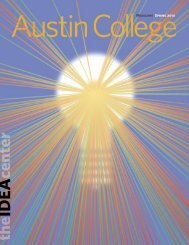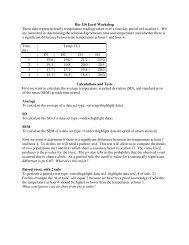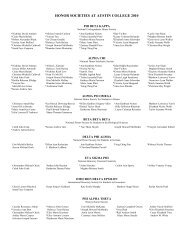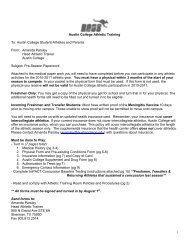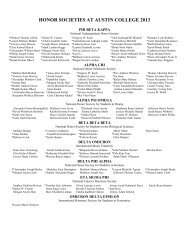Create successful ePaper yourself
Turn your PDF publications into a flip-book with our unique Google optimized e-Paper software.
SOCIOLOGY AND ANTHROPOLOGY260 Intermediate Directed Study(Variable course credit)263 Whose Amazon?: Environment,Society, and Development in theAmazon River BasinAn examination of the issues facing the peoplesand environment of the Amazon River Basinfrom a political ecology perspective. The courseexamines environmental conditions and issuesin the region, the impact of national and multinationaldevelopment efforts (mining, oil exploration,road and dam building, deforestation)and development theory on the environmentand peoples of the area, and conflicts of interestamong different groups in the area (settler, Nativepeoples, states, multinational corporations,miners, ranchers). A critical examination of thetheories of development and modernization,sustainable development, nation-building, ethnicity,environmentalism (global warming, etc)and biodiversity will inform the course.265 Latin American Societiesand CultureThis course explores the forces that have shapedLatin American culture, examines indigenouscultures before and after the conquest, thecultural and economic effects of colonialism,the struggle for emancipation, the forging ofnational and ethnic identities, and the impact ofmodernization on communities and nations. Itexamines the human experience in Latin Americafrom an anthropological perspective, probingsuch issues as how ethnicity and class have intersectedin forging national cultures, the changingrelationships between gender and power,the dynamics of grass-roots social and resistancemovements, the impacts of liberation theologyand Protestantism on religious and politicalpractices, the debates over economic developmentand neo-liberal policies, the responses toa heritage of violence, and the struggle of LatinAmericans to define their place in a global setting.No prerequisites. (Fall <strong>2008</strong>)315 War and PeacemakingExplores the study of warfare and peacemakingfrom an anthropological perspective. Some ofthe questions this course will address include:Are humans biologically inclined to aggressionand warfare? Why (and how) is tribal warfareso different from modern warfare? What drivesnations and individuals to go to war? Why dojustice (and revolutionary) movements oftenresort to violence? How do ethnic groupsand indigenous societies resist more powerfuland violent states? How do weapons of massdestruction change the rules of warfare? Howdoes non-violent resistance respond to theforces that create warfare? Prerequisite: Anthropology123, or 235, or Sociology 101, orpermission of instructor. (Spring 2009)365 Race and Ethnic RelationsA comprehensive examination of race and ethnicityas central categories of social experience. Topicsinclude people’s identities and the inequalitiesthey experience, especially as these are perpetuatedwithin the family, education, religion, andother social institutions in society. The analysisintegrates several sociological and anthropologicalapproaches. Particular attention is paid tothe Hispanic/Latino experience in the UnitedStates. Prerequisite: Sociology 101 or Anthropology123 and another anthropology or sociologycourse, or permission of instructor. (Fall <strong>2007</strong>)370 Ethnographic Research MethodsIn this study of the variety of qualitative methodsinvolved in ethnographic research, studentschoose topics for research, collect data throughactual fieldwork, and present their results inethnographic papers. The course will explorethe benefits and limitations of the interpretivemethod and focus on ethnographic writing asan important genre in contemporary culturalanthropology and sociology. Prerequisite: Anthropology123, Sociology 101, or permissionof instructor. (Each spring)450 Advanced Topics in AnthropologyA study of various sub-fields. Prerequisite:Anthropology 123 and another anthropologycourse, or permission of instructor. May berepeated when topic varies.460 Advanced Directed Study(Variable course credit)464 Teaching/Learning Participation(Variable course credit)An individualized study that includes sharingin the instructional process for a particularanthropology course under the supervision ofthe faculty member teaching the course. Openonly to certain highly qualified juniors and seniorsby invitation. (Additional details given inthe section on Other Learning Opportunities.)490 Independent Study491 Anthropology Honors Thesis492 Independent StudyOff-Campus/NSOC148 |COURSES OF INSTRUCTION



